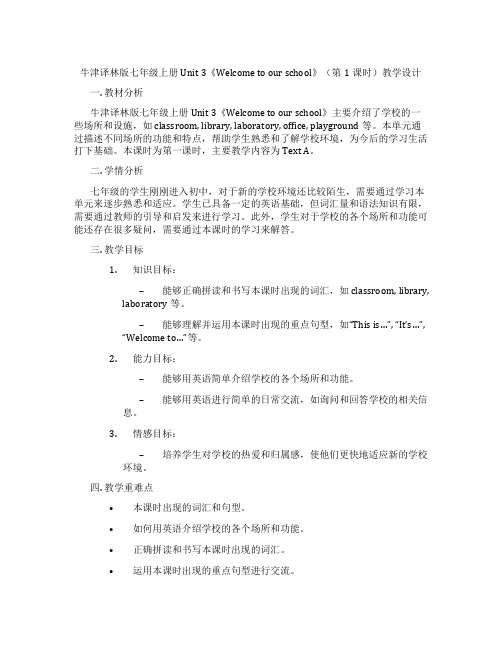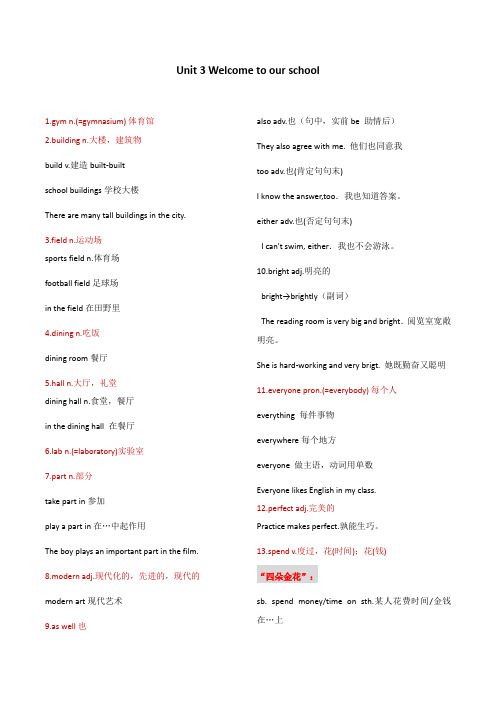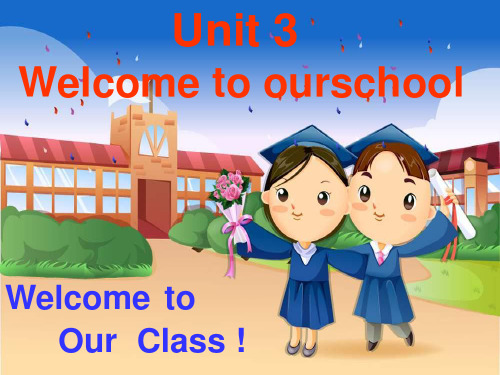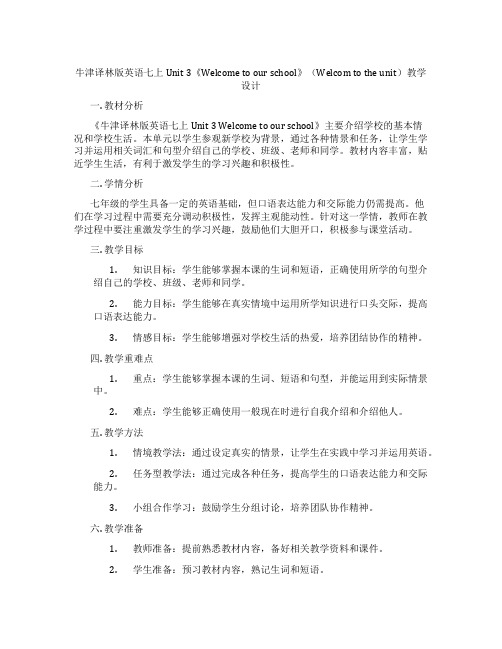牛津译林英语 七年级上册unit3 welcome
牛津译林版七年级上册Unit 3《Welcome to our school》(第1课时)教学设计

牛津译林版七年级上册Unit 3《Welcome to our school》(第1课时)教学设计一. 教材分析牛津译林版七年级上册Unit 3《Welcome to our school》主要介绍了学校的一些场所和设施,如classroom, library, laboratory, office, playground等。
本单元通过描述不同场所的功能和特点,帮助学生熟悉和了解学校环境,为今后的学习生活打下基础。
本课时为第一课时,主要教学内容为Text A。
二. 学情分析七年级的学生刚刚进入初中,对于新的学校环境还比较陌生,需要通过学习本单元来逐步熟悉和适应。
学生已具备一定的英语基础,但词汇量和语法知识有限,需要通过教师的引导和启发来进行学习。
此外,学生对于学校的各个场所和功能可能还存在很多疑问,需要通过本课时的学习来解答。
三. 教学目标1.知识目标:–能够正确拼读和书写本课时出现的词汇,如classroom, library, laboratory等。
–能够理解并运用本课时出现的重点句型,如“This is…”, “It’s…”, “Welcome to…”等。
2.能力目标:–能够用英语简单介绍学校的各个场所和功能。
–能够用英语进行简单的日常交流,如询问和回答学校的相关信息。
3.情感目标:–培养学生对学校的热爱和归属感,使他们更快地适应新的学校环境。
四. 教学重难点•本课时出现的词汇和句型。
•如何用英语介绍学校的各个场所和功能。
•正确拼读和书写本课时出现的词汇。
•运用本课时出现的重点句型进行交流。
五. 教学方法1.任务型教学法:通过完成各种任务,如小组讨论、角色扮演等,激发学生的学习兴趣,提高学生的参与度。
2.情境教学法:创设真实的学校环境,让学生在情境中学习英语,提高学生的实际应用能力。
3.交际式教学法:通过师生互动、生生互动,培养学生的口语交际能力,提高学生的语言运用水平。
六. 教学准备1.教师准备:–制作课件和教学素材,如图片、视频等。
Unit 3 Welcome to our school单词详解 教案 新牛津译林版英语七年级上册

Unit 3 Welcome to our school1.gym n.(=gymnasium)体育馆2.building n.大楼,建筑物build v.建造built-builtschool buildings学校大楼There are many tall buildings in the city. 3.field n.运动场sports field n.体育场football field足球场in the field在田野里4.dining n.吃饭dining room餐厅5.hall n.大厅,礼堂dining hall n.食堂,餐厅in the dining hall 在餐厅b n.(=laboratory)实验室7.part n.部分take part in参加play a part in在…中起作用The boy plays an important part in the film.8.modern adj.现代化的,先进的,现代的modern art现代艺术9.as well也also adv.也(句中,实前be 助情后)They also agree with me. 他们也同意我too adv.也(肯定句句末)I know the answer,too.我也知道答案。
either adv.也(否定句句末)I can't swim, either.我也不会游泳。
10.bright adj.明亮的bright→brightly(副词)The reading room is very big and bright.阅览室宽敞明亮。
She is hard-working and very brigt. 她既勤奋又聪明11.everyone pron.(=everybody)每个人everything 每件事物everywhere每个地方everyone 做主语,动词用单数Everyone likes English in my class.12.perfect adj.完美的Practice makes perfect.孰能生巧。
牛津译林 七年级英语上册unit3 Welcome to the unit(共17张)-课件

after that two of our lessons
1. Welcome to…
1. 欢迎到。。。
2. Which of the subjects do 2. 你最喜欢哪一门功课? you like best? I like …best. 我最喜欢。。。
=Which subject do you like
Unit 3
Welcome to ourschool
Welcome to Our Class !
1. which /witʃ/ 2. best /best/ 3. so /səu/ 4. biology /bai`ɔlədʒi/ 5. geography
/dʒi`ɔgrəfi/ 6. history /histri/ 7. date /deit/ 8. meeting /mi:tiŋ/ 9. o’clock /ə`klɔk/ 10. OK /əu`kei/ 11. gate /geit/
e.g. the Teachers’ Day the teacher’s desk the teachers’ office
Summary
生物 地理
历史 我们的开放日
家长会
在2点钟
在校门口
在那之后
我们的两节课
聚沙成塔
biology geography
history our Open Day
the parents’ meeting at 2 o’clock
(3) Where does Millie meet her mother?
They meet at the school gate .
Act Out
Mum: What’s the date today, Millie?
牛津译林版七年级上册英语 Unit 3 Welcome to our school 高频易错题(含解

七年级上册英语Unit3高频易错题姓名:_________ 班级:_________ 学号:_________易错题方向:1.重要句型:How开头的特殊疑问句引导词的区别、there be 的就远原则、It is +adj+to do sth 2.重要语法:few/little/a few/ a little的区别、一日三餐前面不需要加the、by+交通工具、with与have的区别、第一/第二/第三人称代词的排序、国家对应人的复数形式3.重要单词:fish的两种含义、spend doing sth、need to do sth4.重要短语:far away from的省略问题、have no time to do sth与have a great time doing sth的区别易错题型:1.单项选择-30题2.单词拼写-11题3.动词填空-6题4.翻译句子-11题一)、单项选择1.My home is _______my school.A.far B.far away C.far away from D.near from2.--What time do you usually _______school in the morning?--At about 6:45 a.m.A.get B.come C.get to D.have to3.He has ____books.He often borrows some from the library.A.little B.a little C.few D.a few4.I have ____books.I can read them after class.A.little B.a little C.few D.a few5.Can we finish the work with _______________(少)people and ______(少)money.A fewer, lessB less; fewC little; fewD less; less6.My brother likes to play ______ volleyball before ______ supper.A.the; the B./; the C.the; / D./; /7.Millie usually goes to school _______.A.by bike B.by a bike C.on bike D.ride a bike8.-- does the girl going swimming every week? --Twice.A.How often B.How long C.How many D.How many times 9.I hope you to see me soon.A.to come B.will come C.comes D.are come 10.--Do you know the teacher a pair of glasses? --Oh, she is Miss Yang.A.has B.have C.with D.in 11.________ will go to visit history museum on next Sunday.A. She, you and I B. You, she and I C. I, you and she D. Her, me and you 12.--_______woman is David's mother?-- The one in the red coat.A.What B.Which C.Who D.Where13.________ will go camping on Sunday.A. They, you and we B. You, they and weC. We, you and they D. They, we and you14.--- There is _______milk in the fridge.Please buy some on your way home.---- All right.A.much B.many C.little D.few15.The vegetables are good _______us.So please eat _______.A.for; less B.at; less C.for; more D.at; more16.--- I get the first place at the sports meeting.---__________________.A.Good, thank you B.Really? Congratulations C.Not at all D.It's OK17.I like to eat some _______and _______in the morning.A.potatoes; mangoes B.potatos; mangos C.potatos; mangoes D.potatoes; mangos 18.How many _______do you want?A.glass of apple juice B.glass of apple juicesC.glasses of apple juice D.glasses of apples juice19.--- _______TV does he watch every day? --- For two or three hours a day.A.How long B.How many C.How often D.How much20.--- What do you have _______supper? --- There _______some milk and bread in the fridge.A.in; is B.to; are C.of; is D.for; is21.Tom is fat.The doctor asks him to _______and _______.A.eat more; exercise more B.eat less; exercise lessC.eat less; exercise more D.eat more; exercise less22.I always have rice with _______and an apple ________lunch.A.fishes; for B.fishes; on C.fish; for D.fish; on23.There _______a kilo of apples in the bag.A.have B.are C.has D.is24.In our school there are_______.A.two Englishmans and a Japanese B.two Americans and two EnglishmenC.two Englishmen and three Japaneses D.three American and two Japanese25.There is_______ "U" and_______ "s" in the word “use".A.a;a B.a; an C.an; an D.an; a26.We usually have rice_______ fish and vegetables_______ dinner.A.with; for B.for; with C.with; at D.at; for27.Come on, children.Help yourselves(随便吃点)to some_______ if you like.A.fish and chicken B.fishes and chickensC.fishes and chicken D.fish and chickens28.I usually chat on the Internet_______ two hours_______ three times a week.A.for; for B./;/C./;for D.for;/29.-Are_______ at home? - Yes, they_______ at home.A.all your family members; are all B.all your family members; all areC.your all family members; are all D.your all family members; all are30.---___________does your school have the parents' meeting?---Twice a year.A.How oftenB How longC.How manyD.How much1.Please (not close) the door before (leave) the classroom..2.“U” (be) a letter, but “You” (be) a word.3.What about (buy) some presents for your sister?4.One of my classmates (borrow) some books from the library.5.Thank you for (chat) with me on the Internet.It makes me (feel) better.6.Miss Li teaches _______(we) English.7.Simon never eats _____________(零食)between meals.8.Show me the _____________(菜单),please.9.Eating a lot of vegetables is good for our h_____________.10.A dancer should do some exercise every day to k_____________ fit.11.A rabbit likes eating c_____________.三)、动词填空1.(read) is fun, so we should spend more time (read).2.He has no time (talk) to his cousin。
牛津译林版英语七上Unit 3《Welcome to our school》(Welcom to t

牛津译林版英语七上Unit 3《Welcome to our school》(Welcom to the unit)教学设计一. 教材分析《牛津译林版英语七上Unit 3 Welcome to our school》主要介绍学校的基本情况和学校生活。
本单元以学生参观新学校为背景,通过各种情景和任务,让学生学习并运用相关词汇和句型介绍自己的学校、班级、老师和同学。
教材内容丰富,贴近学生生活,有利于激发学生的学习兴趣和积极性。
二. 学情分析七年级的学生具备一定的英语基础,但口语表达能力和交际能力仍需提高。
他们在学习过程中需要充分调动积极性,发挥主观能动性。
针对这一学情,教师在教学过程中要注重激发学生的学习兴趣,鼓励他们大胆开口,积极参与课堂活动。
三. 教学目标1.知识目标:学生能够掌握本课的生词和短语,正确使用所学的句型介绍自己的学校、班级、老师和同学。
2.能力目标:学生能够在真实情境中运用所学知识进行口头交际,提高口语表达能力。
3.情感目标:学生能够增强对学校生活的热爱,培养团结协作的精神。
四. 教学重难点1.重点:学生能够掌握本课的生词、短语和句型,并能运用到实际情景中。
2.难点:学生能够正确使用一般现在时进行自我介绍和介绍他人。
五. 教学方法1.情境教学法:通过设定真实的情景,让学生在实践中学习并运用英语。
2.任务型教学法:通过完成各种任务,提高学生的口语表达能力和交际能力。
3.小组合作学习:鼓励学生分组讨论,培养团队协作精神。
六. 教学准备1.教师准备:提前熟悉教材内容,备好相关教学资料和课件。
2.学生准备:预习教材内容,熟记生词和短语。
七. 教学过程1.导入(5分钟)教师通过提问方式引导学生谈论学校生活,激发学生的学习兴趣。
例如:“What do you like about our school?”“Can you introduce your classmates?”2.呈现(10分钟)教师展示教材图片,引导学生说出相关生词和短语。
牛津译林版英语七年级上册Unit3 Welcome to the unit课件

回答为:I like … best. / My favourite … is …
1. I’m good at it! be good at 擅长于 我擅长于英语。 I’m good at English. Lisa 擅长于画画。 Lisa is good at drawing.
New words 1.哪一个 pron. 2. 因此,所以conj. 3. 生物 n. 4. 地理n. 5.历史 n. 6.日期n. 7.会议;集会n. 8.(表示整点)……点钟adv. 9.大门n. 10.最好的
which so biology geography history date meeting o’clock gate best
Unit 3 Welcome to our school!
Welcome to the Unit
Learing aims
揭标引学
➢掌握中学常见的几门课程的 名称
➢使用适当的语言谈论学校生 活
1我哥哥每周去游泳四次。 My brother _g__o_e_s_s_w__im__m_i_n_g_f_o_u_r_t_i_m_e_s a week.
--- What day is it today? --- It’s Thursday.
1. Our parents’ _m__e_e_t_in_g____ (meet)
begins at three o’clock in the afternoon.
2. Parents watch some of our
5.我姐空闲时间喜欢听音乐。 My sister e_n_j_o_ys__li_st_e_n_in_g__to__m_u_s_ic__in_h_e_r_f_re_e__ti_m_e. 6.这有趣的故事使得他感到很开心。 The interesting story m__a_k_e_s__h_im__f_e_e_l_v_e_r_y_h_a_p. p 7.我希望你的梦想能变成现实。 I hope _y_o_u__r _d_r_e_a_m__c_a_n_c_o_m__e_t_r_ue. 8.他真的想参加下届世界杯。 He _re_a_l_ly__w_a_n_t_s_t_o__p_la_y__in__th__e_n_e_x_t_W__o_r_ld__C_u_p_.
牛津译林版英语七上Unit3《Welcometoourschool》(Studyskills)说课稿

七年级的学生已经掌握了一些基本的英语语法和词汇,但是对于一些复杂的学习技能和交际用语还不够熟悉。因此,在教学过程中,我们需要注重基础知识的巩固,同时逐步引导学生掌握一些新的学习技能和交际用语。此外,学生的学习兴趣和动机也是我们需要关注的重要因素,通过创设有趣的教学活动,激发学生的学习兴趣和动机。
•I can swim.
•Can you play the piano?
•You can borrow this book.
3.功能知识点:
本课主要涉及到以下日常交际用语:
•Greetings and introductions: Hello, nice to meet you, my name is…, where are you from?
(6)I study English for 1 hour every evening.
(7)You can borrow books from the library.
三、交际练习:
4.根据情景,完成对话:
A: Hi, my name is Tom. What’s your name?
B: ________________________________________
2.语法知识点:
本课主要涉及到一般现在时态的肯定句、否定句和疑问句的构成和用法。例如:
•肯定句:I go to school every day.
•否定句:I do not go to school every day.
•疑问句:Do you go to school every day?
此外,本课还涉及到情态动词can的用法,表示能力、可能性、允许等。例如:
A: Can I borrow your pen?
牛津译林版英语七年级上册要点梳理Unit3Welcometoourschool

七年级上册单元要点梳理Unit 3 Welcome to our school一、教学目标1. Use right words to talk about school life.2. Use proper words to introduce your school to others.3. Learn personal pronouns: subject form and object form.4. Practise using personal pronouns correctly.5. To get information by reading and listening; To make communications with the related topics.6. To understand the sounds of common consonants.7. Write an article to introduce your school or your ideal school.二、四会单词which, best, so, geography, history, date, meeting, o’clock, OK, gate, show, around, front, building, ground, bright, modern, hall, diary, wall, pardon, phone, take, a.m., p.m., only,sure, kind, borrow, letter, few, away,三、重点词组(短语)School Open Day 学校开放日, the parents' meeting 家长会,at the school gate 在学校大门处, show sb. around (somewhere) 领某人参观(某地), in front of 在……前面, ground floor 底楼,一楼look at 看一看let me see 让我看看,after class 课后say hello to sb. 向某人问好on the phone 通电话from...to... 从……到……get up 起床go to school 去上学reading room 阅览室all kinds of 各种各样的,borrow...from... 向……借…… a few 一些,少量,on foot 走路,步行so big 这么大far away from 远离, all the best 一切顺利,万事如意.四、重要句子(句型)1. Which of the subjects do you like best? = Which subject do you like best? 你最喜欢哪个科目?2. What is the date today? = What date is it today? 今天几号?3. What time is it? = What’s the time? 几点了?4. It’s open from 8 a.m. to 5:30 p.m. (open为形容词,be open开着的,敞开的)从早上8点到下午5点半开放。
- 1、下载文档前请自行甄别文档内容的完整性,平台不提供额外的编辑、内容补充、找答案等附加服务。
- 2、"仅部分预览"的文档,不可在线预览部分如存在完整性等问题,可反馈申请退款(可完整预览的文档不适用该条件!)。
- 3、如文档侵犯您的权益,请联系客服反馈,我们会尽快为您处理(人工客服工作时间:9:00-18:30)。
English interesting, useful …
Art
learn how to draw/make kites…
Chinese
speak … well, write good articles(文 章) …
Geography learn about the world
Maths ……
clever, use it in our life…
Tips for speakers:
Be active(积极) and brave(大胆)! Speak louder(大声) and clearly(清楚)!
Tips for listeners:
Listen politely (礼貌倾听)!
Whether you like them or not, (无论你喜欢 与否)
He will act out (表演). Please try to guess!
Art
He will act out (表演). Please try to guess!
Maths
Subjects
BC公元前 AD公元后
History
/'hIstrI/
learn about the things that happened(发生) in the past(过去)
It’s…
现在是…
时间表示法:
★分钟≦30
6点10分: six ten= ten pas = half past six
★分钟>30
6点40分:six forty = twenty to seven
在”几点几分”介词用at: at 6:10
5.o’clock 表示“点钟”,用于整点的后面, 可省略。不能用于带有分钟的时间之后。
我生病了,所以我没去上学。 I am ill, so I don’t go to school.
so 副词,意为“如此,这么;非常” 这幢楼如此高。 The building is so high.
3.What’s the date today?今天几月几号?
It’s October …
今天是十月…
Which fruit do you like, apples,bananas or oranges? ★What 提问时不强调限定范围,意为“什么” 你最喜欢什么颜色?
What colour do you like best?
★So I can eat three. 2. so 连词,意为“因此,所以”
9 G EO G R A P H Y O 10 11 12 13 14 15 16 17 18 19
Say the names of the subjects together!
Music
PE
Maths Math
History
Art
Chinese
Geography
English
Biology
A: Which subject do you like best?/ Which of the subjects do you like best? Why?
Date
October 10
Activity
Open Day
Things to do
the parents’ meeting (2:00p.m.)
watch two of our lessons
Listen and judge:
• 1.The date of the Open Day in Millie’s school is180October.( F )
all the subjects are important(重要) and useful(有用) to us.
Love them and work hard at (努力学习) them!
You can do it!
parents visit(参观) school
watch their lessons
do
(3:00p.m.)
vote for(投票) a new monitor(班长)
A: What’s the date today? B: It’s August 28. Oh, tomorrow
is our … Can you come, Dad? A: Yes, I can. What time is it? B: The parents’ meeting begins at … After that, parents … A: OK. I’ll come on time.
Unit 3
1. To grasp the new words 2. To talk about different subjects 3. To talk about the Open Day at
school
It can improve(提高) your IQ. Listening to it can make some plants (植物) grow well. It can make us happy and relaxed (放松). It can make us healthy and live a long life.
日期表达法:
10月1日 October 1(st) , 1(st) October
读法:October the first
2012年10月9日 October 9(th), 2012
9(th) October, 2012
读法:October the ninth,
two thousand and twelve
Subjects
know the whole world
and travel around the Geography
world easily.
/dʒI'ɔgrəfI /
Subjects
Biology
/ baI'ɔlədʒI /
know a lot about animals and plants
Because he likes eating very much.
1. Which of the subjects do you like best? What is your favourite subject?
1. Which 表示在一定范围内进行选择, 意为“哪一个”。 你喜欢哪种水果,苹果、香蕉还是橘子?
B: I like…best because… What about you? A: I like…best because … . /
My favourite subject is … because …
Music
make me happy/ relaxed…
PE
is good for (对…有利)my …, strong
have parents’ meeting
play games
Do you want your parents to come to our school for these activities?
Make a dialogue(编对话) with your classmates!
A: What day is it today? B: It’s Thursday. Oh, next
Music
He will act out (表演). Please try to guess!
PE
He will act out (表演). Please try to guess!
Chinese
He will act out (表演). Please try to guess!
English
日期表达中的介词: It happened ___i_n___1949. It happened ___in______ October, 1949. It happened ___o_n_____ October 1,1949.
总结:在“某一年”介词用 in 在“某年某月”介词用 in 在“某年某月某日”介词用 on
• 2. Millie’s mother can go to her school. (T )
Read and fill:
Tomorrow is O_c_to_b_e_r_ 10th. There will be a p_ar_e_n_t_s’_ meeting in Millie’s school. It will b_eg_i_n___ at 2.00 p.m. After the meeting, parents will w_a_tc_h___ two lessons.Mother will meet Millie at the school g_a_te___ at half past one.
October the ninth the ninth of October
A: What’s the date today? B: It’s October 9. Oh, tomorrow is
our …. Can you come, Mum? A: Yes, I can. What time is it? B: The parents’ meeting begins at … After that, parents … A: OK. I will come on time.
So, our school is the b_e_st___ place.
Read the poem(诗歌) aloud!
A wonderful place
Our school is a beautiful place, with trees and flowers; It’s an important place, for us to live, to learn and grow; It’s a nice place, for everyone to fly the dream; And it’s the place, for our dreams to come true. What a wonderful place!
